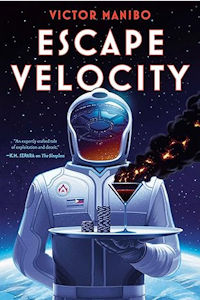Paul Di Filippo Reviews Victor Manibo’s Escape Velocity
 Escape Velocity, Victor Manibo (Erewhon Books 978-1645660842, hardcover, 368pp, $28.00) May 2024
Escape Velocity, Victor Manibo (Erewhon Books 978-1645660842, hardcover, 368pp, $28.00) May 2024
The Jacobean Revenge Tragedy is a mode not unprecedented in SF. The instance that comes most readily to mind is Bester’s The Stars My Destination, modeled on one of the most famous such, The Count of Monte Cristo. And now, with Victor Manibo’s sophomore novel, the field gets another vivid enactment of injustices avenged. Except that this time, it’s not purely a personal quest, but rather a sociopolitical vengeance, proles against the elite. It’s an occasion when many of the sins of one particular class come home to roost, and are adjudicated by ideological vigilantes. Your sympathies will very likely come to reside with the vigilantes (although they are dubbed literal “terrorists” by their opponents). And if so, that’s because Manibo stacks the deck rather heavily against their victims. Such a bunch of self-centered sociopathic stinkers have seldom strutted the stage before.
The year is 2089, and there are several orbiting luxury resorts, favored by the one percent that can afford them. The scene of our tale is the most swank of them all, the Altaire. It has bars and theaters, hot tubs and lounges, restaurants and space-walk facilities. It is staffed by obedient and seemingly servile workers from many Third World countries. The whims of every guest are paramount.
Readers will instantly recognize the archetypical cruise ship environment and scenario, dissected most unmercifully in David Foster Wallace’s “A Supposedly Fun Thing I’ll Never Do Again.” The essential identity between, say, the Carnival Sunrise or Royal Caribbean’s Oasis of the Seas and Altaire forces us to ask the question: could this novel have been cast equally effectively as a mimetic novel? My conclusion is: almost. But Manibo layers in enough stefnal tropes and themes and cultural changes—the colonization of Mars plays a large role in the action—that his transplantation of the narrative from early-21st-century seas to late-21st-century space seems justified. In fact, any resemblance between Altaire and its 2024 sailing counterparts serves the purpose of illustrating a point: the rich will always be with us.
Onto the Altaire disembark from shuttles a group of the world’s richest and most powerful men and women. They all attended the tony private school Rochford, and this is their twenty-fifth reunion. They anticipate nothing but fun and games.
Manibo limns the main characters deftly and colorfully. (Not every one of the 242 guests from Rochford gets the spotlight, natch.) There is the married couple of Nick and Henry Gallagher, with the latter being the CEO of GDX Pharma. Charles Sloane, kind of a popinjay, tries to make up for the loss of his family’s fortune. Isobel and Julian Lonsdale, another couple, sit at the helm of many interlocked firms, including Lonsdale Aerospace. Tom “Laz” Lazaro is a famous diplomat. And Ava Khan is another CEO, heading the Khan-Powell Financial Group. This last-named person carries with her an air of unsettled mourning and lack of closure, for her brother, Ashwin, was mysteriously murdered back in their school days. This old crime, still festering, will erupt during the retreat.
And finally we have the crewmembers, a smaller cast whose main figure, Cielo Mallari, emerges as the most well-rounded.
The first third of the book consists of the machinations and hedonism of the Rochford posse, a veritable soap opera of excess. It’s rather like watching the siblings in Zelazny’s Amber series go at each other, without any of the Amber wit or charm or elegance. The reader quickly marks these people down as ripe for a comeuppance. And that’s what Manibo is primed to deliver. We begin to get hints from Cielo and her peers of some kind of mutiny brewing. So while the Rochford gang plays their carnal games and mind games—including resurrecting the old enigma of Ashwin’s death—subterranean rumblings begin to accrete. And finally, Manibo delivers his Götterdämmerung finale.
Manibo does manage to give his rich wastrels a few redeeming qualities. And the vigilantes do not exhibit any low-minded impulses for wealth or personal paybacks for all the insults they’ve endured. But this high-minded zealotry has the effect of making them and their actions seem almost more inhumanly inexcusable than otherwise. As I said earlier, your sympathies and allegiances may vary.
Escape Velocity reads like an amalgam of Donna Tartt’s The Secret History with Edward Abbey’s The Monkey Wrench Gang and Nathaniel West’s The Day of the Locust. If you season the mix with a soupçon of Heinlein’s The Moon Is a Harsh Mistress, filtered through a Che Guevara lens, you’ll have the winning recipe.
 While you are here, please take a moment to support Locus with a one-time or recurring donation. We rely on reader donations to keep the magazine and site going, and would like to keep the site paywall free, but WE NEED YOUR FINANCIAL SUPPORT to continue quality coverage of the science fiction and fantasy field.
While you are here, please take a moment to support Locus with a one-time or recurring donation. We rely on reader donations to keep the magazine and site going, and would like to keep the site paywall free, but WE NEED YOUR FINANCIAL SUPPORT to continue quality coverage of the science fiction and fantasy field.
©Locus Magazine. Copyrighted material may not be republished without permission of LSFF.






